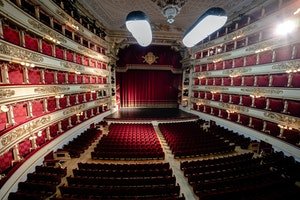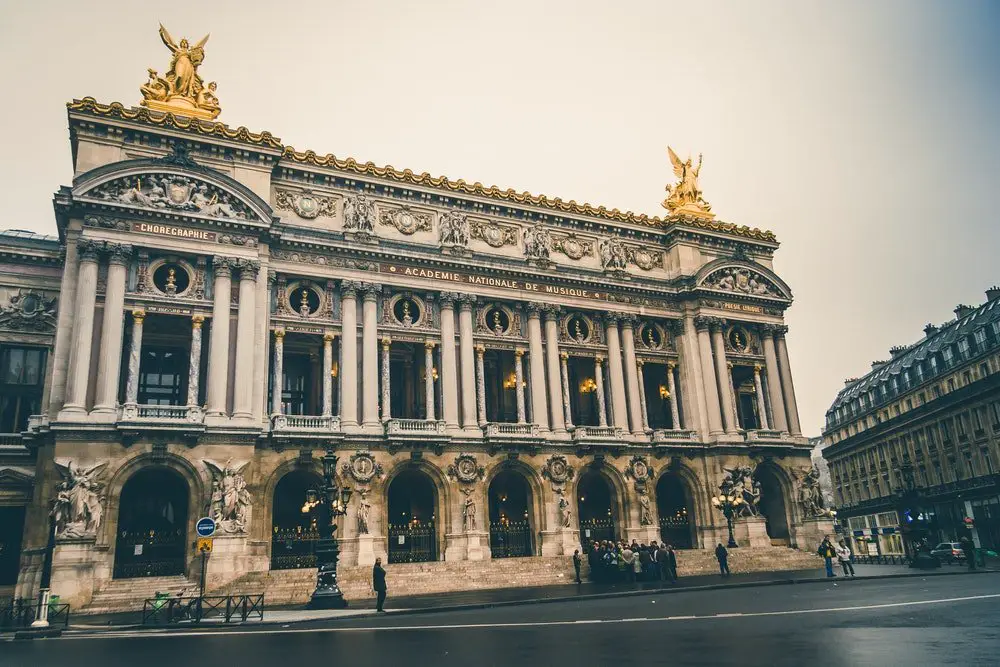What Language Is Opera Sung in?
Taking a deep dive into opera is a great way to enjoy this exquisite art. It will definitely make you have a greater appreciation for it.
Opera is unique because it tells a story through music. And, after all, music is excellent at conveying emotions, feelings, and sometimes even adrenaline.
As opera involves music, and music involves voice and words, you might be wondering what language opera unfolds in.
What language is spoken in opera?
What about when it comes to singing?
Whether you’re new to opera or want to dig deeper into this world, learning about the language is helpful.
This way, the next time you go for a performance, you’ll have a better understanding of this art.
Let’s find out what language opera is sung in.

Origin of Opera
To understand what language opera is sung in, it is essential you know about the origin of opera.
Italy is the birthplace of this art. Jacopo Peri, a composer and singer, was the first to compose an opera.
His work, Dafne, was performed for the first time in 1598. The aim was to revive Greek drama, which he considered to be a classic.
According to the Camerata de Bardi (or Florentine Camerata), which was the group that wrote the piece, Greeks sang the chorus part of their dramas.
However, unfortunately, most of the work is lost.
Euridice from 1600, also by Jacopo Peri, is the oldest surviving opera.

What Language Is Spoken in Opera?
Since now you have some knowledge about the history of opera, let’s look at what language opera is spoken in.
As it originated in Italy, the language of choice for composers was Italian.
Even legendary composers such as George Frideric Handel and Wolfgang Amadeus Mozart preferred to write their pieces in this language.
One of the reasons for choosing Italian over other languages was because of its connection to music.
Think about the terminology used in opera. You’ll find words like “tempo”, “allegro”, “crescendo”, and “adagio”, which are all Italian.
Another factor for choosing Italian had to do with the actual sounds of Italian.
For instance, Italian, in general, has no oxytones. An oxytone is a word with a stress on the last syllable, like the words “corrECT” and “rewARD” in English.
On the other hand, it has just seven vowel sounds.
This combination of sounds makes the language very smooth, musical, and melodic.
In other words, Italian provided the perfect context for singing.

Are Operas Always in Italian?
When opera was in its infancy, the language used was Italian.
However, later on, operas were not necessarily always sung in Italian.
If you look at operas from Bel Canto to the Giuseppe Verdi era, the compositions weren’t always in Italian.
Composers supervised their pieces also in French.
Until the end of World War II, it was acceptable to translate and perform the opera in the native language of the country.
This was possible even when the original composer didn’t give permission.
As a result, there were pieces composed in different languages.
After World War II, there was a shift in this trend. Artists started to focus on the original versions instead of the translated versions.
Nowadays, you can find operas in Czech, English, German, Russian, and Spanish, with other languages also growing in popularity.

Is Opera Sung in Latin?
You may also be wondering if opera is sung in Latin.
Most operas are not sung in Latin. This is because, again, opera originated in the 16th century when Latin was no longer widely used.
Instead, operas are sung in modern European languages.
Having said that, some old operas were written in Latin and very few not-so-old operas are sung in Latin.
For instance, Apollo et Hyacinthus is Mozart’s first opera. He wrote it in Latin in 1767 at the age of 11. It is based on the works of Ovid, a Roman poet, who wrote about the Hyacinth and Apollo in Metamorphoses.
De temporum fine comoedia (Latin for A Play on the End of Time) is an opera by 20th-century German composer Carl Orff. It was a highly personal work, in which he presented a mystery play that summarized his view of the end of time. It was sung in Ancient Greek, German, and Latin.
Should Opera Be Translated?
When performing the opera in its written native language, artists can convey the original vision of the composer, who created the piece based on his native language.
Therefore, when operas are sung in their native languages and are not translated, they preserve their authenticity.
Although translations of operas were popular in the past, there were issues with this.
If you’ve used any translation software or studied language, you know a literal translation doesn’t always work. For instance, a translation cannot always convey emotional overtones.
When composers create their pieces, they match every syllable of their text with a musical note.
Now think about the process of translating it into another language.
Not only should it convey the message clearly, but the words have to rhyme with the music.
As a result, it can be quite confusing for the audience to listen to a translated opera.
So, ideally, opera shouldn’t be translated.
The solution to this is having supertitles.
Let’s find out about what supertitles are…

What Are Supertitles?
Imagine having to sit through an entire opera and not understanding a word.
Do you think you could feel the same emotions as if you actually understood it? How much do you think you could really grasp?
Instead, imagine listening to a translated version. Wouldn’t you feel frustrated for not listening to the opera in its original language?
To get around this problem, supertitles were introduced.
Supertitles are basically like the subtitles you see today in modern TV shows and movies, with the only difference being that they’re used in opera.
In opera, the supertitles appear on the proscenium arch or space above the stage.
You may also find them on a small screen, located in front of the seat.
If this is the case, you can choose from multiple languages.
Initially, supertitles were considered to be a distraction. However, they have become a part of the opera culture.
In fact, supertitles were a lifesaver in the world of opera as everyone could enjoy this beautiful art form.
It was a blessing for the world of opera as the increase in accessibility improved attendance and sales.
Also, it is helpful to members of the audience who have hearing difficulties.

Do Opera Singers Have to Be Fluent in Many Languages?
It’s not compulsory for opera singers to be fluent in other languages.
However, it is a fact that opera singers prefer to train in multiple European languages. This is because it’s important for them to understand what they are singing.
It helps them overcome one of the barriers preventing them from connecting with their audience: language.
By learning different languages, it becomes second nature for the artists to sing in a different tongue.
Keep in mind that not all operas are written and performed in foreign languages. In the 20th century, it became common to use English. Even today, there are plenty of operas in English.

Do Opera Singers Have to Learn Italian?
Italian is beautiful, melodic, romantic.
And, as we have previously mentioned, Italian is the main language in opera.
For this reason, professional opera singers usually have some knowledge about Italian grammar, vocabulary, spelling, and especially phonology and diction.
Even though opera singers do not necessarily have to learn Italian, having some linguistic background would definitely be beneficial to them.
However, if уоu are not a professional opera singer, but enjoy opera and would like to understand the verses of уоur fаvоrіtе pieces, then you could learn Italian.
Not only is Italian the language of ореrа, but also the language of dеѕіgn, аrtѕ, cuisine, wine, love, landscapes.

Should I Learn Italian to Enjoy Opera?
You don’t necessarily have to learn Italian to enjoy opera.
Remember when you go to see an opera you usually have supertitles, so that you can enjoy the opera in its original language and understand.
However, learning Italian it would definitely make your experience more enjoyable.
You’ll also feel proud for understanding what they’re saying without having to check the supertitles every two seconds.
In any case, learning a second language is always beneficial. To be specific, there are many benefits when it comes to learning Italian.
For instance, if you learn Italian, you’ll be able to socialize with Italians and learn about their culture.
By connecting and communicating with them in their native language, you’ll be able to grasp the subtilities of the Italian culture, which is amazing!
Just think of Italy’s history, art, music, literature, architecture, landscapes, food, wine…
You’ll be able to learn much more about all of that if you do it in Italian.
And if you’re into music and opera, you’ll definitely appreciate them much better if you know some Italian.
You don’t need to be bilingual, though, to enjoy opera.
Start by getting used to its sounds and accents.



